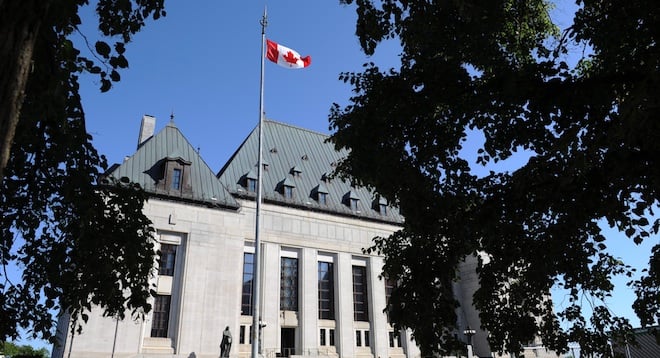Did Beverley McLachlin do anything wrong? Did the Prime Minister?
The latest discussion around a remarkable back-and-forth
Sean Kilpatrick/CP
Share

In the matter of the Prime Minister and the Chief Justice—see here and here for the story so far—there is now a request, from the Advocates’ Society, that Mr. Harper correct his suggestion that Beverley McLachlin did something inappropriate.
Chief Justice McLachlin is one of this country’s most distinguished jurists, and has been for many years. She has fulfilled her duties as Chief Justice with great dedication, integrity and distinction, and does not deserve to be treated in such an unfortunate fashion. The comments at issue here can only serve to undermine the respect and confidence of ordinary Canadians in the proper administration of justice, and we therefore urge you to make a public statement advising Canadians that the Chief Justice did not conduct herself inappropriately in any way. Nothing less than such a correction will repair the potential damage caused by these remarks.
In an email to the Globe, the Prime Minister’s director of communications seems unmoved. Meanwhile, I’ve not yet received any response to my question about whether or not the government considers Peter MacKay’s conversation with Beverley McLachlin to have been appropriate.
Liberal MP Irwin Cotler, who served as justice minister for three years, writes that the PMO’s statement was “extremely troubling” and risks “eroding the reputation of one of Canada’s most formidable institutions responsible for upholding of the rule of law.” And he defends both the idea of communication between the Chief Justice and the government of the day and the Chief Justice’s involvement in the appointment process.
If McLachlin were appropriate to consult regarding the names on the short list, and appropriate also to the work of the panel and to be consulted by them, surely she was an appropriate person to provide her own advice directly to the minister.
The Globe cites professor Dennis Baker as squaring this matter with some nuance.
Dennis Baker, a political scientist at the University of Guelph, said he believes it is possible that the Chief Justice made a minor error by trying to contact the Prime Minister after she was consulted by the committee responsible for selecting the next Supreme Court justice and after she had flagged a potential issue to the Justice Minister.
“If you repeat a warning – and you are the one who ultimately decides the issue – such warnings can easily take on a different character,” he said.
However, Prof. Baker added that such a mistake – if it was a mistake – is very minor and occurred with enough grey area to be defensible. “It surely does not warrant the prominence and attention the [Prime Minister] seems to want to draw to it,” he said.
Lee Akazaki, former president of the Ontario Bar Association, argues that Beverley McLachlin overstepped.
As lawyers, we respect and honour our Chief Justice, and take her at her word. As I read her office’s release, I wondered: What could have possessed her?
… If an issue is worthy of being “flagged” in this manner, there has to have been some recognition that the controversy might end up in litigation if the candidate so “flagged” was then nominated.
Lorne Sossin, dean of the Osgoode Hall law school at York University, narrows in on the principle of a “depoliticized” judiciary. And hopes that this matter might still be defused.
The press releases issued by the Prime Minister’s Office and the Office of the Chief Justice are unprecedented and deeply troubling not because of their content (which seems to have been precipitated by a PMO and Prime Minister using a bit of double hearsay to speculate on what might have motivated a potential communication) but because of their coding. The coding from the PMO and Prime Minister is that no one is beyond being thrown under the bus when Stephen Harper feels backed against the wall (as he must have following the latest string of Supreme Court rebukes of his policies and positions). The coding from the Chief Justice is that no one can impugn her reputation and integrity with false innuendo and expect her to maintain judicious silence. In this showdown, no matter who blinks, we all lose. The justice system requires not only judicial champions, but also political champions. The “depoliticized” framework for judicial independence is incredibly fragile. If judges intervene to influence policy, or if government questions the legitimacy of judges, public confidence in the justice system will erode…
Moving beyond who did not call who last July before an appointment that is now not an appointment, the time is ripe for political leadership by the Prime Minister, the Minister of Justice and their staff in order to depoliticize the relationship between government and the courts. The Chief Justice must also be open to turning the page (and there is no indication she would not be, having dedicated more than a quarter century to building public confidence in the justice system).
See previously: The Prime Minister’s Office vs. The Chief Justice and The Prime Minister’s Office vs. The Chief Justice, Part II